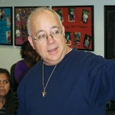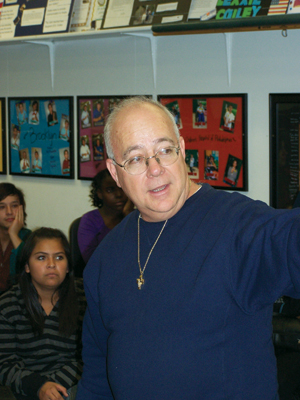 Ron Wakefield received his undergraduate degree in clarinet performance from the University of Southern California studying under Mitchell Lurie and Yehuda Gilad. He was a studio clarinetist and bass clarinetist and performed with the LA Philharmonic and an orchestra in Mexico. He became the band director at North Park Middle School in Pico Rivera, California in the fall of 1990. Since then his groups have won numerous awards.
Ron Wakefield received his undergraduate degree in clarinet performance from the University of Southern California studying under Mitchell Lurie and Yehuda Gilad. He was a studio clarinetist and bass clarinetist and performed with the LA Philharmonic and an orchestra in Mexico. He became the band director at North Park Middle School in Pico Rivera, California in the fall of 1990. Since then his groups have won numerous awards.
Why did you apply for a job at North Park?
I was on a concert tour in Switzerland in 1988 when I suddenly realized I wanted to teach. I returned to school, earned my teaching credential, and applied for a job at El Rancho High School in Pico Rivera. I did not get that job, but the interviewer said that a position at North Park had just opened up, and I took that job.
What was the program like when you started?
It was a real mess. While waiting to interview, I walked into the band room and spoke to some of the students. There entire band program consisted of one small ensemble, and the students told me their director never let them perform, ever. One student asked me, “If you become our teacher, do you think we could do some things?” I decided right there that if I was offered the job, I wanted it. I started with 18 students in a single band class. I now have just under 200 split between four ensembles with a waiting list of 30. That is one quarter of the student body. When I first started, no one knew how to read music. They had a numbering system like the one used for teaching beginning recorder, and these numbers were written in the music. No one knew the names of the notes, and the eighth grade clarinet players could not play above a throat-tone Bb.
Where did you start with such a troubled program?
The first thing was to instill music fundamentals and take everyone back to square one. With so few students, it was easy to teach music reading, correct posture, breathing, and so forth. They had to relearn everything from scratch, but they were willing to do this because they really wanted to play. The way I corrected posture was to refuse to let the band play until everyone was sitting on the edge of the chair with feet flat on the floor like a professional musician. If you wait until everyone has good posture, then it never becomes a problem again.
I promised them concerts, festivals, and parades that first year, and we did it all. They had never performed a concert, much less a festival, but that year we received a rating of two IIs and a I. After that, it was always straight I ratings. Once we were established in parade competition, North Park went on a 15-year streak of going absolutely undefeated by middle schools in Southern California, and few high school bands could touch us, either.
How did you get the community behind you?
Success at festivals and competitions quickly created interest and support from the parent organization and the community. Competitions were a stepping stone for us. We do not focus on them now, but initially it was a way to get established. The students and the community were really proud of our success and that rallied people to support us and come to our fundraisers. Then the top blew off when we were invited to the 1997 Rose Parade. We were invited again in 2005.
How were you selected for the Rose Parade?
In 1993 I was a national finalist in the Disney American Teacher Awards, so the band performed on television from Epcot Center in Florida. The president of the Tournament of Roses saw us and thought that we should be in the Rose Parade. He invited me to come for an interview. He wanted to ask how I would prepare a middle school band to march in a six-mile parade. He later visited the school and was impressed by the spirit and attitude of the students.
How did the Rose Parade affect your program?
It paved the way for us to perform at Carnegie Hall. I had Carnegie Hall in my head, jokingly, when people asked what we would do after the Rose Parade. Then I discovered a band festival that is held every spring in Carnegie. They had never accepted a middle school, but I enquired whether they would be interested in our group. They said no, but I kept asking and mentioned that we were the only middle school to perform in the Rose Parade. Finally, I made a deal with the head guy, who was getting tired of hearing from me. I said that I would stop bugging him if he would listen to a recording of the band performing. He agreed and quickly called back to invite us.
What classes do you teach?
We have an honor band of 42 members, an advanced band of 40, an intermediate band of 40, and a beginning band of about 75. I also teach a music appreciation class. For the last trimester, all seventh-grade band students work in the piano keyboard lab, one day a week. They understand music theory better when they have experience on the keyboard. Beginning pianists have no problem playing three sharps because they can see the keys in white and black. It is often difficult to explain why there is En and Eb to 6th and 7th grade flute players. Flutists cannot even see their fingers when they play. For years I would gather students around the keyboard to demonstrate, but felt that they would do better with actual playing experience. We raised money for 30 electronic keyboards, and set up a lab.
In a new program started last year, eighth grade students take a guitar lesson once a week. Students loved the idea of playing guitar, and it enhances their entire musical education. Many directors are so concerned about the quality of their concert group that they feel they do not have time for other things. What is really important is a well-rounded education, and I am willing to sacrifice a slight amount of quality on the concert programs for this.
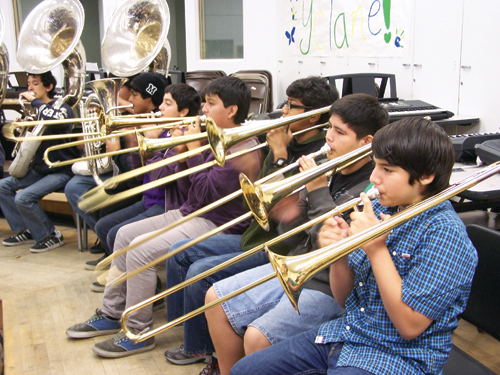
How is the program structured?
I have beginning, intermediate, advanced, and honor bands. The students do not audition, which avoids competition, but I assess them throughout the year. I have also eliminated seating placement. No one sits first chair anymore, and it is working amazingly well. In the honor band there are 12 clarinets that are split into three teams. Each team has one of the strongest players and one of the weakest players, and they rotate on the parts. Because we play many concerts, everyone has a chance to play first clarinet. The result is that all of the students progress and excel at a much higher rate than when we had chair tryouts. Saxophones, trombones, and trumpets are set up the same way. This eliminates the problem of students getting stuck in the third clarinet section all year.
Your students take on an unusual degree of leadership. How does that work?
It is much different than it used to be. When we competed, there was a drum major and band president. We don’t have that anymore, and the students now have opportunities to be in charge of many aspects of the program. I rarely conduct anymore, unless it is a piece of music that is too sophisticated for a student to direct. An example might be show tunes from South Pacific with frequent transitions and changes in tempo. Otherwise, concerts are completely student-led. They conduct and do the announcing. Each piece has a different conductor, and there are many soloists. The students are supportive of each other and take on a great deal of responsibility. Last year, I had an eighth grade girl who was able to rehearse the band amazingly well. She would cut them off and say, “Trumpets, you’re a little bit too loud, but there is one person sticking out more than everyone else.” I was so astonished. I made comments to her privately, but not in front of the class. She ran the whole rehearsal and presented the piece in a concert.
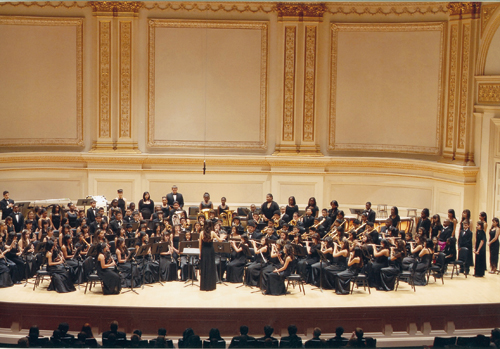
With the top honor band, all 42 members have a chance to conduct at least once and play a solo during a concert. Every student who would like to speak in public is given the chance to introduce a piece at a concert. When we have a concert, I just sit back and enjoy it.
How do you get middle school students to the point where they can conduct an entire band?
Students can rise to a much higher level than many teachers realize. When you give them an opportunity, they thrive on it and work really hard. I teach them conducting throughout the year. They are not highly sophisticated conductors, but they know the patterns. Over the course of three years at this school, they become pretty good conductors by eighth grade.
Students in the band learn about conducting from each other. While they rehearse music under a student conductor, they learn what to watch for in the conductor and know what to do when it is their turn. There is no peer pressure. Students feel free to make mistakes when they know they will not be laughed at. They learn to give cues and signal sections if they are too loud. They are not afraid to cut the band off if they hear something wrong.
The focus of your program dramatically shifted to include work with homeless shelters. How did this come about?
After the Rose Parade and Carnegie Hall performances, we began taking tours to different locations including Canada, Hawaii, and London. We began to change from a powerhouse competition band to something quite different. Initially we skipped some competitions to prepare for our trips. Then, while in New York for a Carnegie Hall performance in 2004, I heard about an orphanage in upstate New York called the St. Cabrini Home. It was probably the last American orphanage, even though they do not call it an orphanage anymore. They had a senior center as well as orphaned children. A few days before the Carnegie Hall concert, we took buses upstate to play there. The students felt it was the most meaningful part of the trip. After we played, my students visited with the audience.
Soon after, I discovered a homeless shelter in Santa Ana and suggested that we play a Christmas concert there. Just before we were about to play, a four-year-old girl from the audience climbed up onto a chair next to a flute player, preventing another flutist from sitting down. I started to ask her to move but caught myself and asked for another chair. The little girl stayed in the front row of the band while we played. Once the concert was underway, she slid off the chair and crawled into the flutist’s lap and started hugging her. Tears began pouring down my flutist’s face as she played. I knew things were never going to be the same after this.
A fourth grade girl at the homeless shelter came up to me after this concert and said she would give anything to do what my students do. While they had music at her school, she said they did not trust the homeless kids with the instruments. I got an instrument and began giving her lessons. Other students at the shelter wanted to play, and I soon had a little band. It became too much for me to do alone, so I asked a flute student to help teach, and this grew into our outreach program.
We start taking carloads of students to give music lessons in the front yard of this homeless shelter. When we returned to Carnegie Hall in 2007, we took a group of these children with us, and six of them played as a solo group with our band accompanying them. In addition to homeless shelters we now perform at children’s hospitals and senior centers.
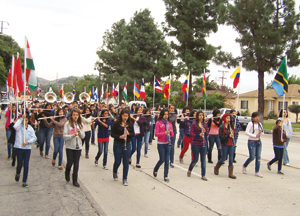 The students we work with often join us in parades, and this led to a final shift away from competing. I have seen band directors pull students out of their ranks at the competition line for a variety of reasons, usually because they could not play well enough. I often did this with beginners who were allowed to tag along for fun and extra experience. Even though those students were not part of the advanced performing group it began to gnaw at me, and many times I let them perform anyways. Now with the homeless kids, I had students in the formation, in uniform, who were not registered at my school and could not participate in competitions.
The students we work with often join us in parades, and this led to a final shift away from competing. I have seen band directors pull students out of their ranks at the competition line for a variety of reasons, usually because they could not play well enough. I often did this with beginners who were allowed to tag along for fun and extra experience. Even though those students were not part of the advanced performing group it began to gnaw at me, and many times I let them perform anyways. Now with the homeless kids, I had students in the formation, in uniform, who were not registered at my school and could not participate in competitions.
I decided to switch to parades with no competition line, such as down Main Street in Disneyland. At first everyone thought I was crazy, but the parades that we do now are much better. When we go to Disneyland, the homeless students march with us in uniform and they are so proud. My students would absolutely riot if I said we were going to compete in a parade. They have beautiful music experiences for the right purposes now, unlike with competition where everything has to be perfect for the judges. One of my assistants, an alumnus who marched the 1997 Rose Parade, asked if I missed competition. I told her to look at the faces of the band as they marched.
Since those days we have developed a relationship with the Shriner’s Children’s Hospital of L.A. among other organizations. We give concerts, and every Monday after school, North Park band students go there and give lessons to the children on recorders. Parents form carpools for the 40-mile round trip, and they actually love doing this. It is amazing.
The various outreach programs have made enormous changes in my students. We have kids helping kids, and the heart and responsibility that is growing in all of them is really amazing. There is a tradition at North Park for the 8th graders to show up and help at the concerts of the younger students. I do not even have to ask; I just post on the board how many chairs and stands in each row, and it gets done. These concerts are extremely informal with a potluck, and students run around outside until they perform. At a recent concert the eighth graders took it upon themselves to supervise the campus. When it was time for the concert, the older students led the beginners over to the stage. There is a huge sense of family in the bands here.
When directors focus on winning competitions or festival ratings that translates into pressure on the students. We have wiped that out completely. The result is relaxed children who come in smiling and happy every day. They make music joyfully and put it to a good use in the surrounding communities.
How did your trip to China come about?
I took an alumni band of older students to China in 2009. My former students would often come back and mention that they wished they had the outreach program when they were in the band. I had received an invitation to China and initially threw it in the trash because of the expense. I started to think that this might be an opportunity for these former students, and about thirty signed up. The original invitation was to play exchange concerts with Chinese schools, but I asked if we could play at orphanages instead. After the band performed, the students gave recorder lessons to the orphan children. The most touching part was that the girl from that first homeless shelter went with us. She was 14 at the time, and I paid her way. She went from a homeless shelter in Santa Ana to teaching music lessons in a Chinese orphanage.
Was there ever any resistance to the outreach program from the administration?
No, it has never been challenged in any way. When I dropped competition, I knew it would cause trouble, especially with the color guard. I did not announce it, but on the last day of the previous school year, I told the color guard that I did not know what was going to happen next year, but I would be in touch with them. I started the following year with a big Ethiopian-themed parade where we did not compete. The event included guest speakers, the Ethiopian national anthem, flags, and food, and the students completed projects on Ethiopia. Some of the color guard girls were upset, but I had already spoken to their parents about a switch to instruments.
What is next for the program?
I am planning a Concert for Peace in November 2013. We will invite students from across the U.S. and from eight different countries to participate in a concert here in Pico Rivera. Anyone who would like to bring a few students from their band to perform with us is invited to contact me. We have commitments from ten states and seven countries so far. We would love to have others. I am also toying with the idea of returning to Carnegie Hall when my current crop of beginners are in eighth grade. They are a really strong group.
Ron Wakefield can be reached at npmsmusic@yahoo.com.
